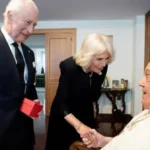Two polio cases have been recorded in Hadejia and Sule Tankarkar Local Government Areas of Jigawa State, despite the state having been certified polio-virus-free for nearly a decade.
This was disclosed by the United Nations Children’s Education Fund (UNICEF) Kano Chief Field Officer, Mr Rahama Rihood Farah, during a one-day Media Dialogue on Polio and Routine Immunisation, organised by UNICEF and held in Dutse, the state capital.
Mr Rahama Rihood Farah was represented by Dr Serekeberehan Seyoum Deres, Health Manager, UNICEF Kano Field Office, who said, “Polio is a highly infectious disease with potentially deadly consequences for young children. It has been the leading cause of paralysis among children and can cause death!”
According to him, “Across the world, 3 billion people have been immunised against polio since 1988, bringing the disease to the brink of eradication. But the fight is not over, including in Nigeria, because low vaccination rates are creating opportunities for polio outbreaks as we are seeing in Nigeria. Recently. In 2025, 18 cases of polio have been reported in 18 LGAs in nine (9) states of Nigeria.”
“Two (2) of these polio cases are in Hadejia and Sule Tankarkar LGAs of Jigawa State. This is unacceptable and must be halted. Polio knows no boundaries and spreads fast. An outbreak in any country puts children in every country at risk.”
The Chief Field Officer maintained that, “In the last 50 years alone, vaccines have saved 154 million lives—that is six people every minute, for five decades. Together, we have made incredible progress. Simply by being immunised, you help to protect others from the spread of disease, just as they help to protect you. We can stop outbreaks and eradicate polio.”
“Ending polio and improving children’s survival starts with making sure all children have access to vaccines. UNICEF calls on the Jigawa State Government, and indeed all states in Nigeria, to take urgent action to stop polio outbreaks and to reach all children with polio and other life-saving vaccines.”
He said UNICEF requests the Jigawa State Government to “declare a State of Emergency on Polio and Routine Immunisation, including a commitment to release State Counterpart funding for polio and routine immunisation. The 27 local government councils’ chairmen in the state should make similar commitments, conduct flag-offs of the upcoming polio vaccination campaign, and commit to releasing counterpart funding.”
Dr Serekeberehan Seyoum noted that UNICEF, in collaboration with the Jigawa State Government through the Primary Healthcare Development Agency, has convened this Media Dialogue to solicit the support of the media in raising awareness and mobilising parents, caregivers, communities, stakeholders, the public, and everyone, about the Polio Vaccination Campaign, which Nigeria has scheduled to implement from 24–30 April 2025.
UNICEF emphasised that the media must regularly disseminate accurate information through their platforms to help combat myths, disinformation, and rumours that misinform and discourage people from taking opportunities to vaccinate their children.
“If children get vaccinated routinely, we will have no need for vaccination campaigns to deal with vaccine-preventable diseases. To eradicate polio and other vaccine-preventable diseases, Nigeria must strengthen its Routine Immunisation efforts. This requires full implementation of the ‘One Functional Primary Healthcare Centre per Ward’ policy. If we strengthen our Routine Immunisation, we can realise a future free from diseases like polio, cervical cancer, and measles.”
Farah further stated that as the global community is focusing attention on human papillomavirus during World Immunisation Week, “UNICEF urges the government and decision-makers in Nigeria to also focus attention on and invest in vaccination against the human papillomavirus (HPV), which causes cervical cancer.”
“We can realise a future free from vaccine-preventable diseases like polio, cervical cancer, and measles. A future where no child dies from illnesses that we know how to prevent—because vaccines are available, safe, and effective!”
Speaking on the development, the Executive Secretary of the Jigawa State Primary Healthcare Development Agency (PHCDA), Dr Sambo, through the Director of Primary Healthcare Services, Dr Hassan Shu’aibu Kwalam, stated that the state has developed and adopted new strategies to re-eliminate the disease.
According to him, the state government, through the agency, has planned a massive immunisation exercise to be launched across the state by tomorrow, Wednesday, targeting the immunisation of all eligible children.
The director explained that a high-level meeting with traditional and religious leaders, chaired by the Chairman of the Polio Enlightenment Campaign Committee and Emir of Dutse, Alhaji Muhammad Hamim Nuhu, was convened to redesign strategies. The meeting also reviewed the entire polio immunisation exercise in Hadejia, with the participation of the Emir of Hadejia, Alhaji Adamu Abubakar Make, and the Emir of Gumel, Alhaji Ahmed Muhammed Sani.
Dr Hassan Shu’aibu Kwalam further explained that a large-scale immunisation campaign is scheduled to commence on 24th April and will last for six days. During this period, over 3,060 teams—comprising three people per team—will be dispatched across 287 political wards in 27 local government areas to vaccinate all eligible children.
He stated, “The agency received over two million doses of vaccine to be administered to the targeted 1.9 million children.”
“In an effort to achieve 100 percent coverage, about 50,000 ad hoc staff have been recruited, including individuals to administer the vaccine, recorders, and supervisors at various levels such as teams, wards, local government area zones, and state levels.”
Also speaking, the Programme Manager of the State Emergency Routine Immunisation Coordination Centre (SERICC), Dr Shehu Ibrahim, remarked, “A total of 1.9 million is targeted to be immunised against the polio disease in the forthcoming polio immunisation exercise to be conducted across 27 local government areas of the state.”
Dr Shehu Ibrahim highlighted that non-compliance, often linked to political attribution in vaccination campaigns, has led to some children missing the vaccine, thereby exposing them and others to the virus.
He expressed concern about political interference in polio and routine immunisation efforts, stating that rejection of vaccines for political reasons remains a serious challenge in reaching all targeted children. “What is the relationship between water supply and routine immunisation?” he questioned.
According to him, “In the February 2025 immunisation exercise, a total of seven children were missed in Garki, Kaugama, and Maigatari Local Government Areas.”
He stated that the state government has introduced various measures to ensure no child is left behind during the upcoming immunisation campaign.
Additionally, he confirmed that immunisation teams would be deployed to markets and border areas to ensure full coverage and to prevent any child from being missed.
ALSO READ FROM NIGERIAN TRIBUNE
WATCH TOP VIDEOS FROM NIGERIAN TRIBUNE TV
- Let’s Talk About SELF-AWARENESS
- Is Your Confidence Mistaken for Pride? Let’s talk about it
- Is Etiquette About Perfection…Or Just Not Being Rude?
- Top Psychologist Reveal 3 Signs You’re Struggling With Imposter Syndrome
- Do You Pick Up Work-Related Calls at Midnight or Never? Let’s Talk About Boundaries






